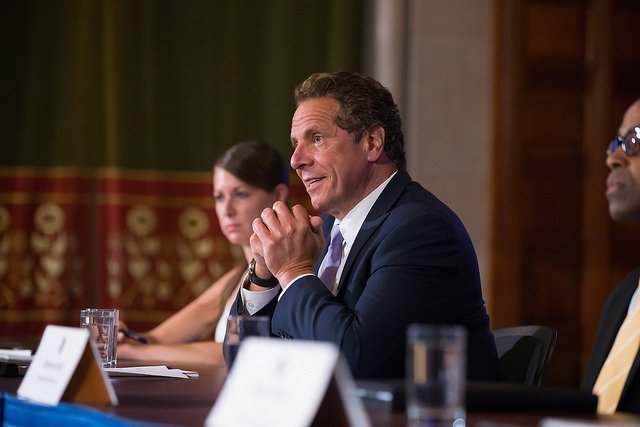Albany, NY - September 19, 2017 - Governor Andrew M. Cuomo today announced the findings of a comprehensive statewide review of compliance under the "Enough is Enough" law at 244 higher-education institutions across the state. The results, coming in the aftermath of Secretary of Education Betsy DeVos's announcement of her intention to dismantle and replace Title IX protections for victims of sexual assault on college campuses, found that the majority of colleges and universities are significantly compliant with the law, although many present concerns that must be addressed in order to be in full compliance.
"In New York, we know that sexual assault is a crime, and we will continue to hold our colleges and universities to the highest possible standards to ensure the safety of all New York students," Governor Cuomo said. "Regardless of the federal government's dangerous actions to rescind Title IX protections, this state and this administration will continue to stand with and advocate for survivors, and we will not go backwards in the fight against sexual assault."
Lieutenant Governor Kathy Hochul said, "We've made tremendous progress when it comes to protecting New York's college students from the sexual assault epidemic that's plagued this nation, but we still have further to go. Under Governor Cuomo's leadership, a vast majority of colleges across the state have adopted the Enough is Enough policies, but until we have 100 percent compliance, there are still young women and men who remain vulnerable. We will not rest until we make sure all New York college campuses are safe for our students."
The statewide review was initiated to ensure that all colleges and universities fulfill their obligations under the law to protect students from sexual assault, dating violence, domestic violence and stalking, and are taking every measure to properly investigate allegations of sexual assault on campus. Governor Cuomo signed "Enough Is Enough," the nation's most aggressive policy to put an end to sexual assault on college and university campuses, into law in 2015.
The statewide review found that, while many colleges and universities have taken steps to comply with the "Enough is Enough" requirements, many institutions have not taken the necessary steps to achieve full compliance. Institutions not fully in compliance will be notified by the New York State Office of Campus Safety. These schools will be required to submit an action plan to achieve full compliance within 30 days, and to submit documentation of full compliance within 60 days of such notification. The full report is available on the New York State Office of Campus Safety website and the data breakdown is available here.
- 95 schools (38.9 percent) were found to be compliant with the requirements. Several schools and systems are demonstrating innovative approaches to protecting students, including: linking law enforcement, campus administration, and victim services to better serve victims of Sexual Assault, as well as using technology to provide informational resources to students and direct access to assistance when necessary.
- 29 institutions (11.9 percent) were found to be non-compliant, meaning their policies were deficient on the majority of elements.
- 120 (49.2 percent) schools were found to be significantly compliant, but presented concerns that must be addressed to achieve compliance with the requirements. Those concerns fall into the categories of training consistency; lack of adequate services available to students; verifications of completion of student training; accessibility and availability of information; definition of confidentiality; missing, inconsistent, or contradictory information; and noncompliant resolution procedures.
Following-up on the results of this preliminary review, the Office of Campus Safety and assisting agencies will begin a second phase of review, focused on addressing shortfalls in institutions' procedures when investigating and adjudicating reports of sexual assault. This second phase will be an in-depth review of campus practices beyond documentation; It will include review of campuses identified as potentially problematic during the initial review, and others where there is an indication of potential non-compliance when handling reports.
Work continues with partners in the advocacy community to identify widespread problems and those specific to individual institutions and cases, to identify best practices for approach to sensitivity of personally identifiable information, and to ensure all necessary steps are taken to protect the identities and personal information of reporting individuals, witnesses, victims, and respondents.
"Enough is Enough" is the strongest law in the nation protecting students from sexual assault. It requires all colleges to adopt or implement:
- A uniform definition of affirmative consent, defining consent as a knowing, voluntary, and mutual decision among all participants to engage in sexual activity;
- An amnesty policy, to ensure that students reporting incidents of sexual assault or other sexual violence are granted immunity for certain campus policy violations, such as drug and alcohol use;
- A Students' Bill of Rights, which campuses will be required to distribute to all students in order to specifically inform sexual violence victims of their legal rights and how they may access appropriate resources. The Bill of Rights clearly states that students are given the right to know they can report sexual assaults to outside law enforcement, including the State Police;
- Comprehensive training requirements for administrators, staff, and students, including at new student orientations.;
- Reporting requirements for campuses to annually submit aggregate data on reported incidents of sexual violence and their resolution to the State Education Department
The results of this review are preliminary, and based upon information submitted by the colleges and universities. The Office of Campus Safety made substantial effort to engage with the schools to ensure that all necessary information was clarified and included in submissions. OCS will continue to work with the schools to supplement the information contained in the report.










